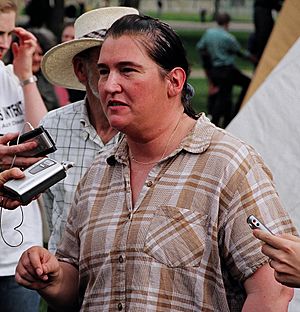Ardoch Algonquin First Nation facts for kids
The Ardoch Algonquin are a community of Algonquin people, also known as Anishinaabe. They live near the Madawaska, Mississippi, and Rideau rivers, north of Kingston, Ontario.
The Ardoch Algonquin community is part of the Indigenous Services Circle. This group works with the city of Kingston, Queen's University, and the Métis Nation of Ontario. The Ardoch Algonquin are not officially recognized as an "Indian Band" by the Canadian government. This means they are sometimes involved in discussions about their community's rights and future.
Contents
History of the Ardoch Algonquin
Protecting Their Land and Resources
In 1844, land was set aside for the Ardoch Algonquin at Bobs Lake. However, this land was later taken over due to illegal logging and new settlements.
In the 1930s, the Government of Canada created a reserve at Golden Lake. They gave official status to the Algonquin people living there. These people became the Algonquins of Pikwàkanagàn First Nation. The Ardoch Algonquins were asked to leave their lands and move to Golden Lake. But they chose to stay on their traditional territory.
The Wild Rice Blockade
In 1981, the Ardoch Algonquin community took action to protect their land. They blocked a company that wanted to harvest manoomin, or wild rice, from the Mississippi River. This rice was important to their culture and food supply. Police later came to the community, and some people were arrested. Even though the blockade ended, the company stopped trying to harvest the rice. No one has tried to claim it since.
Standing Up Against Mining
More recently, the Ardoch Algonquin and Shabot Obaadjiwan communities worked together. They blocked access to a possible uranium mining site near Sharbot Lake, Ontario. This area is part of the traditional Ardoch territory.
The company, Frontenac Ventures Corporation, wanted to test for uranium. They asked the courts to stop the protest leaders. The Supreme Court of Canada has said that provincial governments must talk with First Nations communities before doing any economic activities on their claimed lands. Because of this, the Government of Ontario started discussions with Frontenac Ventures.
In 2008, a judge ruled that Ardoch Algonquin co-chiefs Paula Sherman and Robert Lovelace had not followed court orders. Paula Sherman agreed to follow the orders to avoid prison time. Robert Lovelace, who teaches at Queen's University, was ordered to pay money. The community also faced a fine. The court order said that activists could not go closer than 200 metres to the mining site. However, protests continued in nearby communities.
Later in 2008, a higher court overturned the judge's decision. Robert Lovelace was released from prison. The court said that the conflict could have been avoided. This was because the Government of Ontario had not talked with the Ardoch people before allowing uranium exploration.
In 2008, Shabot Obaadjiwan Chief Doreen Davis and Elder Earl Bedore agreed to encourage their community members not to interfere with the company's work.
Some non-native activists who were also charged had their charges dropped.
In 2011, Robert Lovelace was involved in other protests. These protests were against new developments in the South March Highlands area of Kanata, near Ottawa.


